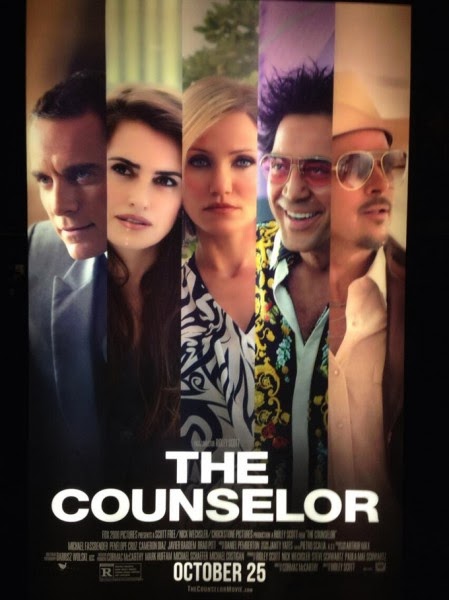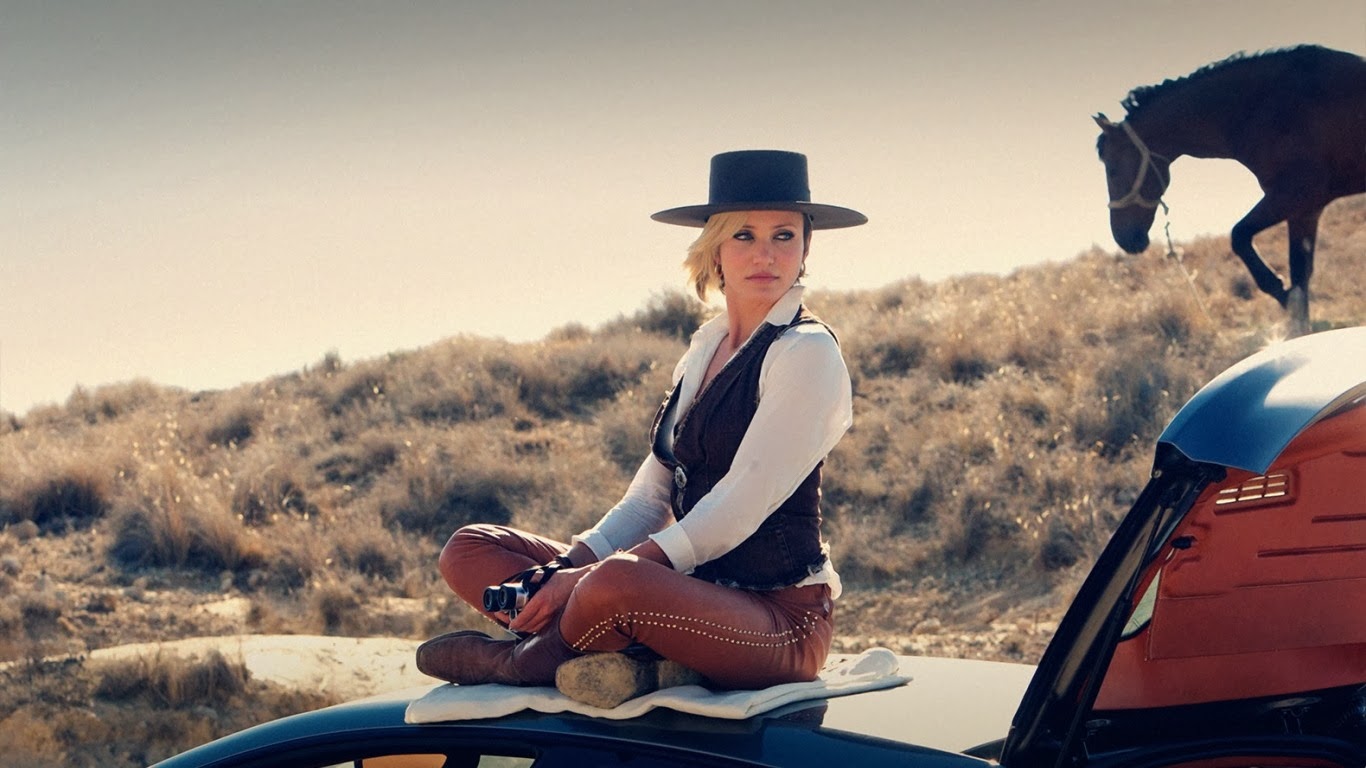 |
| Remember this poster? Well, this is at least better than The Savages. |
Cormac McCarthy stories are almost guaranteed to bum you out in some way. From main characters being brutally murdered to people losing their innocence, his stories don't tend to comfort. In his universe hope is something to be extinguished. This is no less true of The Counselor, crime film that has more in common with a Greek tragedy than it does with film noir. Of course, that's the shame of it. It isn't trashy enough for noir and it isn't finely tuned enough for tragedy.
I went into this with no little anticipation. McCarthy is my favorite author and Ridley Scott is high in the running for my favorite director (despite his recent run of middle of the road features). Toss in an excellent cast on top of that and you have every reason to believe that this is going to be one of the best movies of the year. How could it not? As it turns out this particular Cormac McCarthy story bummed me out in a new and terrible way.
Sorry. I was just sighing there. Give me a moment. Alright. Let's get to it.
 |
| "Congrats! We get paid for this no matter what our Fresh Rating is!" |
As much as The Counselor is a reflection on Classical tragedies or maybe the Drug Wars or maybe even the human soul. Or maybe it's just a bunch of assholes hoping that if they talk long enough they'll get to the point. In Blood Meridian this works. In No Country For Old Men this works. And even in Blade Runner you get the sense that somebody, somewhere, either on screen or off has something of note to say.
The film makers don't seem to know what the film is about, so how is the audience supposed to know? In opaque thrillers like The Spy Who Came in From the Cold and Tinker Tailor Soldier Spy, we're given insight into a world that is completely unknowable to us, yet retains a dramatic spark because somebody in the play does. We're invited to discover what is happening along with the characters. In this case I don't even think the characters know what they had for breakfast. But they sure as hell want you to think that they know.
Maybe the problem isn't that the characters don't know what is going on. It's not their fault that they have no clue what is going on, it's the film makers. They want to make this work of high tragedy with all of the markings of trash pulp and, in the end, it doesn't end up satisfying either genre. Then again, looking at the talent, maybe they did know and they went ahead with it anyways. Now that's a scary thought. . .
All of these concerns aside, the problem real problem of the film is that The Counselor, if it is about anything, it is a movie about furniture.
With every new scene we are treated to a new set, impeccibly shot and designed and with every scene we're treated to another piece of the Herman-Miller collection. Or a French press. Or a computer. Or a cool bar. Or something that you're paying attention to instead of the story. And, oh hey, is that a motorcycle? Cool.
And that isn't a metaphor for the vacuousness of these people's lives. It isn't some sign of their misgotten gains. It isn't a plot point. It isn't mis en scene, for God's sake. It's the movie. It's a series of chairs and tables occasionally broken up by some fool whining endlessly about whatever new nonsense has kinked up their life. And then it goes on for two hours like that and then it ends and you realize that Cameron Diaz must have photos of somebody somewhere.
The movie's fixation with mid-century modern, while laudable is a sign of the film failing on just about every other level. Furniture shouldn't be something I am staring at. Characters should be something I am staring at. Unless I'm autistic and, in that case, that's just how my brain works. In this case I'm just bored. And a little bit angry.
Blade Runner is a movie that I can watch endlessly and, even having seen it probably twenty times, is a movie that still yields little details hiding in the background. It's the perfect example of a world that is fully realized, a world that feeds into the story as the story feeds into it. There isn't a hard line where the plot starts and the set begins, it is all a part of a piece and, like I said with Gravity, that is an incredible sight to see. When it works it is amazing. When it doesn't, it's Avatar.
Ridley Scott, at his best, can design these worlds and make them real in a way that George Lucas once knew how to do and Stanley Kubrick went insane attempting. Even in his less successful films (Kingdom of Heaven leaps to mind), he creates a world with real weight and texture.
 |
| A vision of a much better movie. |
This isn't even Ridley Scott at his worst. I don't know what this is. It is polished mush. Not a turd, it isn't terrible. Despite how hilarious a scathing review can be, it isn't bad. It's worse than that. It's a shining, grey mess that the man who directed Black Hawk Down and Alien and Thelma and Louise should not be capable of creating.
After doing my time with The Counselor, I feel as though I've picked this movie clean of any hidden detail. And the details I've found are unremarkable in all aspects except for how unremarkable they are.
I have the Mark Kermode go-to line about a movie of this nature. That "There's a good 90 minute exploitation movie in there" and as much as I think there's truth in that line, I don't think there is in this case. There is something fundamentally wrong with this film and it cannot be solved by trimming it down. It was perhaps rotten at birth and should have been drowned at the earliest possibility. A lot of heartache and dollars could have been saved that way. Instead we have a fully grown monstrosity to deal with and we have to wonder to ourselves "How could this have gone so bad?"
The Counselor doesn't sadden me because it's awful or because of a widespread series of failures. It saddens me that the collective talents of Cormac McCarthy and Sir Ridley Scott and many others made a work of art that merits the phrase "It's alright."
Who saw that coming?
SIDE NOTES:
This was made for 25 million dollars? Alright. I am slightly more okay with this movie now. Slightly. Guardedly. Shamefully.
After walking out of this, I was left wanting a new, good McCarthy movie that I almost want to see Child of God. You hear that? Jesus Lord. The Counselor has wanted me to seek comfort in the arms of a necrophiliac tone poem adapted by a guy who could barely read a cue card at an awards show.
I'm still going to buy the screenplay. I have a collection to keep up. At the very least, it's always nice to have a cautionary tale that is concrete.
Maybe someone out there will pull a reverse No Country For Old Men and take an average movie and adapt it into a good book. SD Perry, you still working? I think we got a job for you.
I hate Salon, but this review is a delight.
THE AD ZONE:
I just had a comic printed! It's 40 page comic that features a new, 22-page story, along with a ten pager that came out last year in the Freshman Fifteen. It's cheap. It's easy. It's fun and it keep me from dialing that assisted suicide guy that I found on Tor for one more month. It's not on Graphically yet (the old one is), but, in the mean time, think about it, won't you?
I also do a podcast with my friend Cruz (and, formerly, my friend Joe). It's called White Guys, Square Glasses and it's a lot of fun. I think so, anyways. If you like laughter and ribaldry and dirtbags sounding off about movies and stuff, maybe give it a listen? Or at least subscribe to it on iTunes and never listen to it. Either way, we win.
